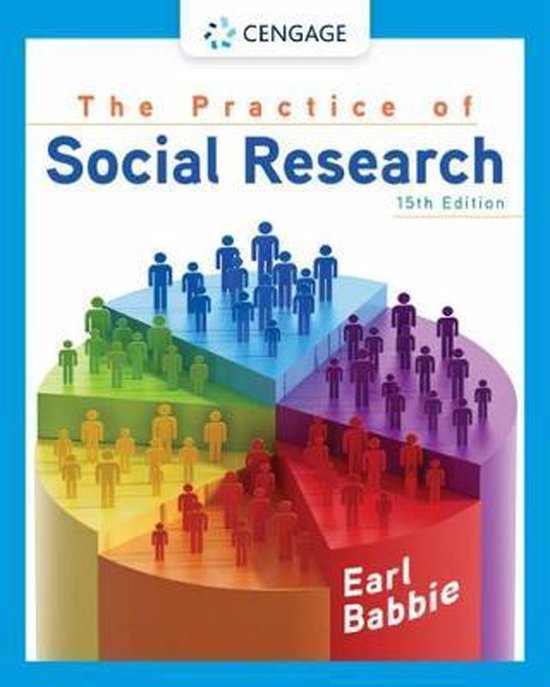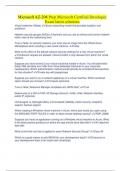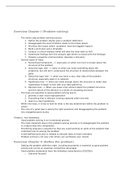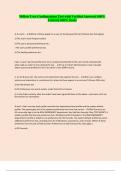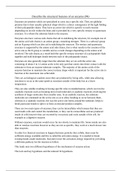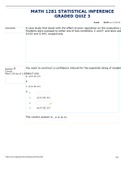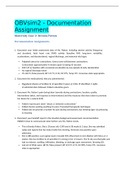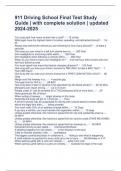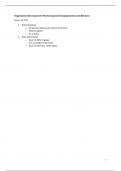Units 1, 2, 3, 4, 5, 6, 7, 8, 9, 10, 11, 23
Unit 1 – What is Empirical research?
Video ‘The Empirical Cycle’
Emperical research: systema?cally answering empirical ques?ons.
Systema7cally: excluding the possibility that other answers are beIer than the answer we
give.
Empirical: about things we can observe
Emperical ques?ons are answered by thinking & observing, and we hope that way gives us
systema?c answers. Answers that are beIer than others.
Procedure
1. Thinking: we think about possible answers to our ques?ons, we talk to others, we
read literature.
2. Planning: we decided how we can test what we think, how we can carefully study if
our thinking is correct.
3. Observing: based on this planning, we observe things, and these observa?ons are
then analysed.
4. Analyzing: is used to arrive at some conclusion, an answer to our ques?ons.
Example of a procedure:
1. Maybe I missed my sta?s?cs exam, because I did not study hard enough
2. Compare all exams I did; see how much I worked and which grade I got
3. I use my electronic calender and the grade centre to check that
4. Wow, yes, only when I studied hard I passed the exam.
This procedure is in the scien7fical literature presented with some difficult concepts:
1. Theory for thinking:
2. Research design for planning
3. Data collec?on for observing
4. Data analysis for analyzing
Wheel of science:
Not a logis?cal sequence of steps: anything goes..
A way to defend conclusions; logic
,Deduc7on: the process of star?ng with theory and then thinking how we can test the theory
Induc7on: the process of star?ng with data and then trying to arrive to conclusions on basis
of data
Example of research
Research ques?on:
“What causes cholera?”
- Dominant idea: agreement reality around 1850: “miasma theory”. Diseases like
cholera are caused by pollu?on or “bad air”.
Theory:
John snow thought it was used by pollutate water. His theory was “drinking fouled water
causes cholera”.
Research design: Dr. Snow decided to compare households that used different waterpumps,
including the much-frequented street-pump in Broad Street.
Data collec?on and data analysis: Dr. Snow tracked down informa?on from hospital records
on when the outbreak began and whether the vic?ms drank water from the Broad Street
pump. He used a geographical grid to chart deaths from the outbreak.
Conclusion:
The conclusion was that the people from the specific pump got cholera, and the other
people didn’t. The other cause was not right.
The wheel of science is not a logis?cal sequence of steps: anything goes…
It is a way to defend conclusions: logic.
,Video ‘Empirical Research Ques8ons in the Context of Decision Making and Design’
Empirical research ques7ons: Research ques?ons that can only be answered using
observa?ons.
How to ques7ons: are empirical, they can only be answered using observa?ons, but they
look a bit different.
The context of empirical research ques7ons
Empirical research ques?ons are ofen asked in the context of decision making.
Decision making
Decision making starts most frequently with a problem & need analysis. We encounter some
problem and we want to solve that. The first thing we do afer finding that problem is find &
design op?ons: what can we do about that problem? It may be a wide range of op?ons that
we then evaluate. Before we do anything, we put all op?ons in a row and we can compare
them and evaluate them, and on basis of that evalua?on we can make a choice. We pick one
or a few of the op?ons and we pick that as our solu?on. Afer we made a choice we
implement it. Making a choice is of course not the same as implemen?ng it. And some?mes
we have to depend on others for implemen?ng our choice. And finally when we are
interested in whether our op?ons worked, we do an ex post evalua?on. We evaluate
whether our choice solved the problem. If it did, we can say that the problem no longer
exists. If it didn’t, then we may need to do it another ?me, find other op?ons, evaluate these
op?ons, evaluate these choices.
Decision making gives rise to Emperical Research Ques7ons
So for example:
, Example: smoking among teenagers
‘How to’ ques?ons can be ‘broken up’ into descrip?ve and explanatory research ques?ons.
“How to reduce the number of people that start smoking?” -> is an empirical ques8on, but
not easy to answer. But the descrip8ve and explanatory ques8ons are far more easy to
answer.
Some examples of these descrip?ve and explanatory ques?ons:
§ Why do (some) people start? à Explanatory
§ What are consequences of smoking? à Explanatory
§ How many people smoke? à Descrip?ve
§ Which policies have been used thus far to reduce smoking? à Descrip?ve
§ Which policies in other areas have been used to change behavior? à Descrip?ve
§ Will the new policy work? à Explanatory
§ How will policies affect people? à Explanatory
§ Did tabacco companies do what they promised to do? (Process evalua8on) à
Descrip?ve
§ Did our policy reduce smoking? (outcome evalua8on) à Explanatory


